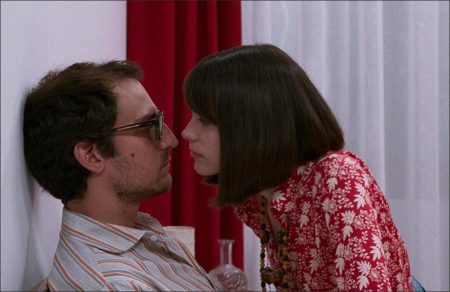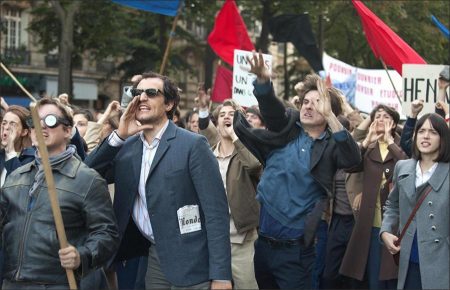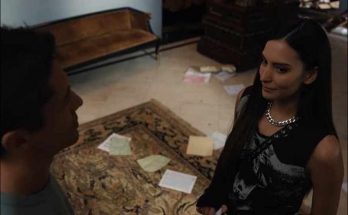Film Review for Redoutable
Redoutable Movie Trailer. Michel Hazanavicius directs French star Louis Garrel as Jean-Luc Godard in this film about the subject’s second marriage and political activism. It feels both trivializing and audacious to treat the political radicalization and marriage breakup of Jean-Luc Godard as something verging on a buoyant comedy, but that’s what Michel Hazanavicius has done in Redoubtable.
Returning to the well of cinema for inspiration after the deadly detour into modern European conflict with The Search, the man behind The Artist takes a knowing if rather breezy approach to the major turning point in a brilliant, and still active, artist’s life. Although the film manages some disarming insights into the man’s complex makeup and difficult behavior, a service enhanced by Louis Garrel’s very good lead performance, serious cinephiles will likely reject it as glib and disrespectful, while more mainstream viewers could be amused but not that interested.
The writer-director based his screenplay on a “novel” by Godard’s ex-wife Anne Wiazemsky about the couple’s marriage, which thus offers the dual prospects of a genuine inside view of a problematic match and a portrait of the New Wave legend that could inherently be tilted in the woman’s favor. Be that as it may, this is no Scenes From a Marriage, as Hazanavicius’ inclination is almost always to search out the laughs and amusement value, which are present in fair abundance.
Focusing principally on the pivotal year — for Godard and France — of 1968, the year after the 36-year-old Godard married the 20-year-old actress and starred her in two films, La Chinoise and Weekend, the film immediately asserts a playful attitude very much in line with the sort of brainy joking often present in his earlier films; Godard likes puns and says things like, “Artists should die at 35 before they become old farts,” and Hazanavicius picks up the baton by reproducing certain famous Godardian shots and camera moves as he introduces his leading couple.
Godard, of course, is the young lion of the French New Wave, a Swiss-born artist widely regarded as the cinema’s intellectual genius, while Wiazemsky is his new muse, replacing first wife Anna Karina. But when street protests begin picking up steam (no mention is made of the year’s early ones in the cause for fired Cinematheque Francaise head Henri Langlois), Godard is fired up and ready for action, quite ready to toss bricks at policemen. Wiazemsky goes along for the ride.
The film casts the protests more like the fashionable sport of the moment than something that brought down a government, and it does include an amusing running gag of Godard’s glasses falling off and breaking at every conflict with authorities, events that he is often filming. Turning him more radical by the minute, however, is young Maoist Jean-Pierre Gorin, whose well-articulated positions rapidly drive Godard not only to ever-more radical thinking but to the point of rejecting his former approach to filmmaking in favor of a revolutionary collective approach.
Wiazemsky is played by the beautiful and slim Stacy Martin, who starred in Lars von Trier’s Nymphomaniac volumes and spends a good deal of her time here in various states of undress, something in which Garrel joins her later on to amusing effect. It’s clear she loves and idolizes the man at the outset, but the emotional trajectory ends up paralleling that of Godard’s earlier masterpiece Contempt, in which the wife is ignored and disregarded to the point where she goes numb and out of love for a man she held in the highest esteem.
As dramatized here, a major turning point is a trip to the 1968 Cannes Film Festival. The festival itself, which in real life Godard and his fellow young French directors were instrumental in shutting down after a few days, is never depicted, only desultory scenes of Godard becoming increasingly unhappy and hostile in a beautiful seaside house.
The film’s most successful sequence is a sustained and commendably timed argument between Godard and six other passengers in a tiny car as they drive back to Paris from the aborted festival. Godard, who by now hates everyone in the group except his wife, lashes out with exceptional venom at one and all, saying even the work of his idols — Renoir, Lang, Ford, et al. — is worthless and should be destroyed, the only exceptions being such anarchic comics as Jerry Lewis and the Marx Brothers.
Going further down the path of political and aesthetic metamorphoses, and eliciting disbelief and jeers from his former loyalists, the director renounces all of his previous films, forms a filmmaking collective called the Dziga Vertov Group with Gorin and is shocked when his wife says she’s going to act in a film by another director, the crazy Italian Marco Ferreri (a well-cast Emmanuele Aita). Her love is gone.
The ending, which shows Godard reluctantly relinquishing the director’s assumed autocratic control of a film (Wind From the East) in deference to the collective decisions of the entire crew, is rather disturbing in that it essentially suggests that Godard committed creative suicide with his break from the past, a notion with which his most ardent champions would take great exception.
He indisputably broke permanently with anything resembling the mainstream at that point, and one could make the argument that the remainder of Godard’s career, which continues still, represents to him what Finnegans Wake does to James Joyce. He long ago ceased being an artist who matters to the general public, but he followed his own path to the point that, arguably, no one else has experimented so extensively in such rarified realms of cinematic language.
Redoutable (2018)
Directed by: Michel Hazanavicius
Starring: Louis Garrel, Stacy Martin, Bérénice Bejo, Micha Lescot, Grégory Gadebois, Félix Kysyl, Arthur Orcier, Marc Fraize, Romain Goupil, Jean-Pierre Mocky, Guido Caprino, Emmanuele Aita
Screenplay by: Michel Hazanavicius
Production Design by: Christian Marti
Cinematography by: Guillaume Schiffman
Film Editing by: Anne-Sophie Bion, Michel Hazanavicius
Costume Design by: Sabrina Riccardi
Set Decoration by: Suzanne Arhex
Distributed by: StudioCanal
Release Date: Epril 27, 2018
Views: 189






